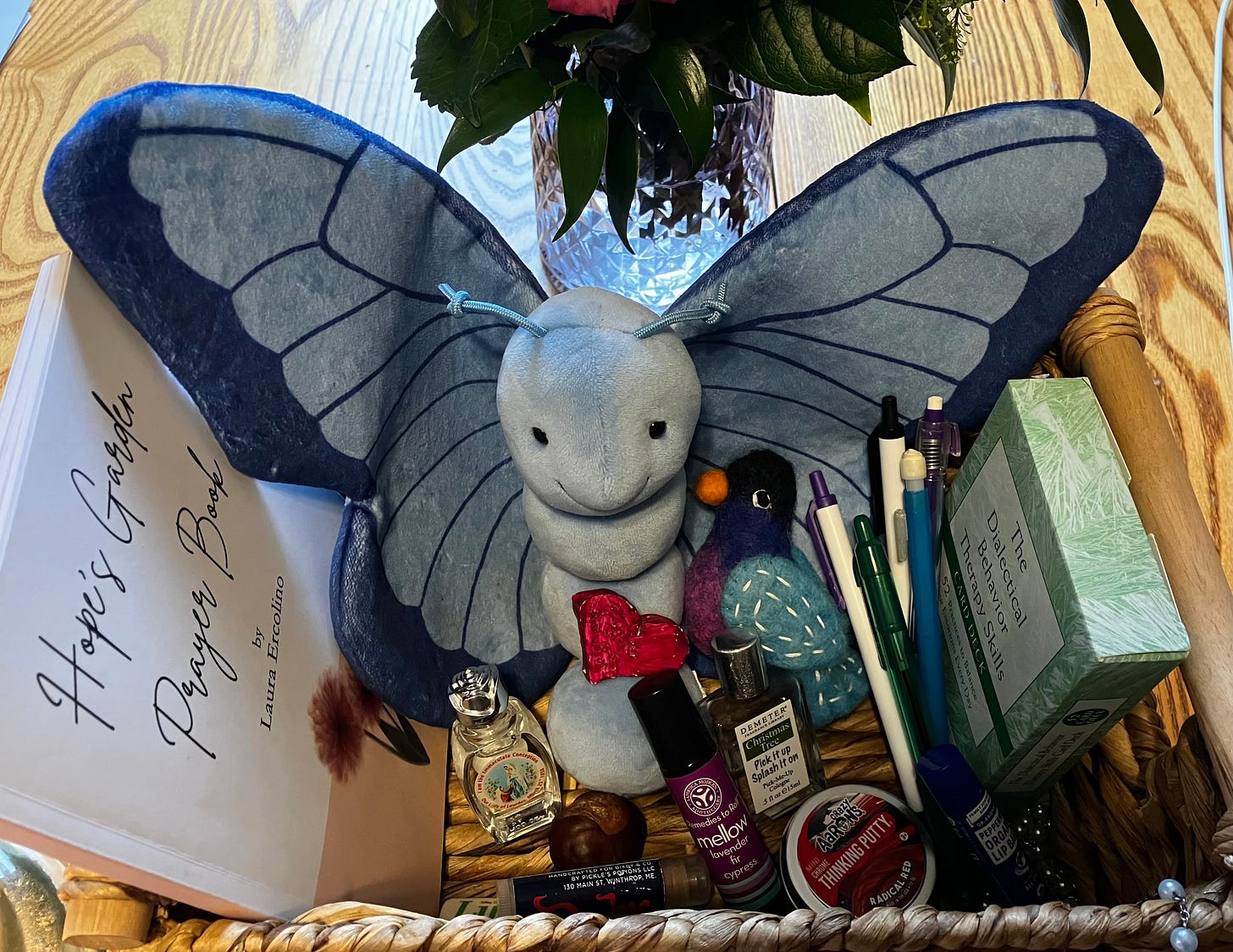Creating a safety plan is one of the crucial “what if” steps of preparation for individuals who are enduring abuse in their home. Crafting ways to carefully escape, to seek security with loved ones or in a domestic abuse shelter, to have all your necessary valuables (including your birth certificate, Social Security card, passport, etc.) in a safe place, are all important issues to consider when creating a physical safety plan.
Creating a physical safety plan with a professional is ideal. To find help in your area, you can call the Domestic Violence Hotline at 800-799-7233. If it’s safe, you could put this number in your phone for quick dialing—but put it under a random name (for example, “Alice,” so it appears at the top of your contact list for easy access), something you can readily find but no one will suspect. Again—and I can’t stress this enough—only do this if it’s completely safe for you. Your safety must always come first.
If you don’t have professional resources available, you can still create your own safety plan. This doesn’t have to mean you’re planning to permanently leave the relationship. For some survivors, permanently leaving may be the best option—but for others, it may be dangerous, unwanted or unfeasible for a variety of reasons. Everyone’s situation is different—trust your instincts and, above all, pray constantly (1 Thess. 5:17). Even if you never end up using it, having a solid plan in place can bring tremendous peace of mind. For full details on how to create a plan, Domestic Shelters offers two excellent articles:
But what about an emotional safety plan? During those times when you’re not in physical danger and don’t want to—or can’t—leave the home, how can you protect yourself emotionally and spiritually?
Creating an emotional safety plan is just as important as a physical one because it’ll help remind you that there is hope and that you do have resources. An emotional safety plan is crucial for self-care and even for developing healthy empowerment and a sense of autonomy.
Healing from the wounds of prolonged trauma is a journey—it takes time, patience, and self-love. It’s often that last piece—self-love and self-care—that trip us up the most.
There are many things we can do to take care of ourselves and help nurture a developing sense of wellbeing while healing from trauma. For example, creating a self-soothing basket filled with items that bring peace, joy, and calm can be an excellent resource for emotional health. Items to include in the basket can included things such as:
Scented candles or essential oils
Chocolate or another small item that awakens your sense of taste in a pleasurable way
Items you cherish, such as special keepsakes
Rosary beads or Holy Water for spiritual grounding and peace
Colorful flowers or something else that’s visually soothing

An emotional safety plan is another way you can develop a sense of grounding and wellbeing. Although caring for ourselves takes various forms for each person, there are basic guidelines and suggestions that can be followed. The ultimate goal is to create a plan you can turn to during times of stress, chaos, or dysregulation, in order to help ground and calm yourself in the present moment. Doing this helps clear the mind, shifting tension away from the body so you can make better decisions and engage more fully in life. It can help you deal with the impact of abuse and reduce the negative repercussions.
Some ideas to help you maintain an emotional safety plan include:
Remember that, above all else, you’re made in the image and likeness of God. In the Song of Songs we hear Christ, our Divine Bridegroom, singing to us, “How beautiful you are, My love, how beautiful you are!” (Song of Songs 1:15). Cherish and trust your beauty as the beloved bride of Christ, and remember how much He desires your good, your abundance, your blessings. Ask for the grace of oneness with Him, for the peace He promises to give us all, if we open ourselves to His bountiful graces. “Peace I leave with you; my peace I give to you; not as the world gives do I give to you. Let not your hearts be troubled, neither let them be afraid” (John 15:27).
Volunteer or become active in your parish community. Volunteer work, especially the kind that’s also spiritually rewarding, helps foster a positive sense of self and deepens your inherent worthiness. It also helps to disengage from the inclination to focus solely on your relationship; instead, by focusing on others, engaging in a Bible study or other parish activities, or being socially active in another healthy way, you can helps take your mind off the chaos and bring your thoughts into a peaceful space.
Find supportive and trusted people who can help. Remaining alone and in isolation only adds to stress, and also tends to create feelings of hopelessness and depression. Seeking comfort and solidarity in those you can trust—people who have your back, who love and respect you—can help create instant calm and relief in the body. Joining a support group or visiting with friends or loved ones are all ways of emotionally caring for yourself.
Create soul space. If you’re wondering what, exactly, “soul space” is, it’s simply this: space within your innermost self where you feel at peace and at rest, no matter where you are physically. Praying for the grace to be able to empty yourself of the toxins of abuse and rest in your own interior space where just you and Christ dwell will create openings in your soul that allow the grace of God to enter. When we ask our Lord for healing graces—for the grace of peace, of inner stability, of restoration—and when we truly open ourselves to respond to the way He wishes to touch our soul, we create the inner space for Him to dwell. “Ask, and it will be given to you; seek, and you will find; knock, and it will be opened to you” (Matt. 7:7).
Find a physical space of your own. If possible, find a physical place in your home where you can feel safe and where you can go to get away from the chaos. It can be as simple as a walk-in closet, the corner of your bedroom, a special area in your back yard—wherever you can go to just be you.
Write out your goals—but make them achievable. Think about small goals you can achieve without feeling overwhelmed. Baby steps are key here—there’s no need to move mountains. Empowering yet simple goals could include prioritizing a daily walk or hot bath, calling a trusted friend at least once a week, or picking up a distracting novel to read a few minutes (or more) per day. Another goal could be to find local resources in your area that may be able to help if want more options to lean on “just in case.” You could also consider seeking the professional help of an informed coach or therapist to help you navigate your journey.
Develop skills that will help calm and sooth your nervous system during times of dysregulation. These can include breath prayer (taking slow, intentional breaths while repeating simple prayers such as “Jesus I trust in You” on the inhale and “Please help me to trust You more” on the exhale), or simply holding Rosary beads. Brushing a beloved pet, creating a piece of art, listening to soothing music, lighting a scented candle, indulging in a cup of soothing herbal tea, wrapping yourself in a prayer shawl, daily Adoration, working out or stretching, enjoying nature … These can all be used to help you return to your innermost self, the part of you that is at peace with our Lord.
When creating an emotional safety plan, you can also ask yourself a series of questions to help you better understand your trauma reactions and triggers, which will help you figure out what you need most during those times. For example, you could ask yourself:
“When I’m triggered and dysregulated, where do I feel it most in my body? Do I have any particular thoughts that I tend to ruminate on, such as thoughts of hopelessness, despair, or even revenge?” Both getting in touch with your body’s response to trauma and taking all thoughts captive for Christ (2 Cor. 10:5) are excellent ways at learning how to calm yourself when in a “fight or flight” reaction to the chaos around you.
“What grounding techniques work best for me?” When considering this answer, think about the 5-4-3-2-1 technique to engage all your senses. When in the midst of anxiety or chaos, you can ground yourself by naming five things you can see, four things you can hear, three things you can feel, two things you can smell, and one thing you can taste. This helps you get back into your body as you shift your mind away from troubling and worrisome thoughts.
“How is my diet, and am I sleeping enough?” Nutritious whole foods and essential rest go a long way in helping your mind stay calm. A regular fitness routine—even just walking twenty minutes a day—also helps keep you regulated.
“What habits make me more anxious, and what brings me peace?” Often our habits exacerbate our feelings of turmoil and anxiety. It’s not uncommon, for example, for people to feel agitated or upset after engaging in social media or watching the news. If an activity derails you on a regular basis, skip it and find uplifting and peaceful activities instead.
Developing healthy coping skills can help you control intrusive thoughts and feelings. An emotional safety plan can clear space in your mind for clarity and peace, which then allows the healing power of Christ to enter. This, in turn, can help you better understand where you are today, and where God wants you to be tomorrow.






This is a well-done article. I never thought of the basket idea. It would also be a good idea to give to someone you know is suffering. My counselor also recommended counting by 3s or spelling words backwards, to re-engage your reasoning side of the brain and create calm